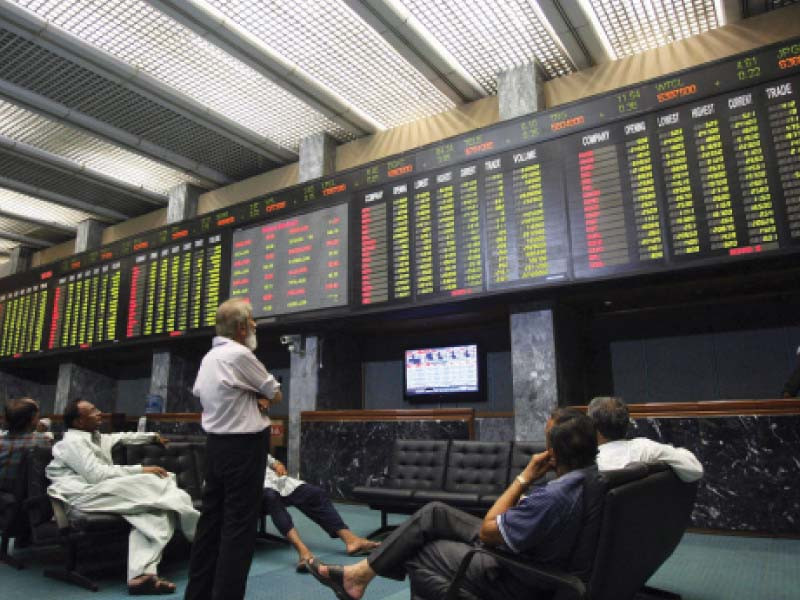
The Pakistan Stock Exchange endured a roller-coaster session on Friday, as the benchmark KSE-100 index, after a feeble start, managed to notch up decent gains and breach the 45,000-point mark.
Market participants were once again observed showing their concern over the persistent slide in the rupee against the US dollar, which touched a new record low at Rs184.09 in the inter-bank market.
However, speculation about the end to the prolonged political turmoil by Sunday (April 3) instilled optimism among investors, who eventually opted to cherry-pick stocks at attractive valuations across the board.
The market commenced trading with a steep fall, touching an intra-day low of 44,655 points during the initial hour, mainly owing to worries about the continuous depreciation of the rupee against the greenback.
However, the benchmark index soon recovered the losses and managed to close the first half at 45,192 points.
The second half began with a surge as the index touched an intra-day high of 45,396 points. However, late session selling wiped off some of the gains.
At close, the benchmark KSE-100 index recorded a rise of 223.28 points, or 0.50%, to settle at 45,152.11 points.
Topline Securities, in its report, said that the KSE-100 index opened on a negative note but soon entered the positive zone as the day progressed.
“The positivity in the market can be attributed to the no-confidence vote against the prime minister in parliament on Sunday, as investors expect the ambiguity to end on the political front,” the report said.
“Major contribution came from United Bank, Engro Corporation, TRG Pakistan, Habib Metropolitan Bank and Indus Motor, as they cumulatively added 146 points to the index.”
On the flip side, Colgate-Palmolive (Pakistan), Engro Fertilisers, Service Industries, Allied Bank and Standard Chartered Bank lost value, which pushed the index down by 76 points.
A report of Arif Habib Limited stated that the KSE-100 index opened in the red territory due to political uncertainty and further rupee devaluation against the dollar.
The market remained volatile throughout the day. However, a rally was witnessed in United Bank and MCB Bank due to expectation that foreign selling in the banking sector was ending, it said.
“The cement sector was in the limelight due to a decline in international coal prices. In the second session, value buying was witnessed, which led the index to close in the green zone,” the report said.
Sectors contributing to the performance included banks (+125.7 points), technology (+34.1 points), fertiliser (+31.96 points), auto assemblers (+28.3 points) and textile (+14.2 points).
JS Global analyst Mubashir Anis Naviwala said that a roller-coaster ride was seen in Friday’s trading session due to the rising political temperature in the country. “Healthy participation was, however, witnessed.”
Telecard Limited (+1.8%), TPL Properties (+3.1%), Treet Corporation (+1.4%), Ghani Global Holdings (+0.5%) and Cnergyico PK (+2.1%) were the top contributors in terms of volume.
“Going forward, we recommend investors to avail any downside as an opportunity to buy in cement, banking, technology and textile sectors,” the analyst said.
Overall trading volumes decreased to 389.1 million shares compared with Thursday’s tally of 415.6 million. The value of shares traded during the day was Rs11.1 billion.
Shares of 364 companies were traded. At the end of the day, 183 stocks closed higher, 149 declined and 32 remained unchanged.
Telecard Limited was the volume leader with 35.4 million shares, gaining Rs0.26 to close at Rs14.43. It was followed by TPL Properties with 26.4 million shares, gaining Rs0.62 to close at Rs20.82 and Treet Corporation with 24.9 million shares, gaining Rs0.47 to close at Rs34.4.
Foreign institutional investors were net sellers of Rs885.5 million worth of shares during the trading session, according to data compiled by the National Clearing Company of Pakistan.
1719660634-1/BeFunky-collage-nicole-(1)1719660634-1-405x300.webp)

1732276540-0/kim-(10)1732276540-0-165x106.webp)

1732274008-0/Ariana-Grande-and-Kristin-Chenoweth-(1)1732274008-0-165x106.webp)












COMMENTS
Comments are moderated and generally will be posted if they are on-topic and not abusive.
For more information, please see our Comments FAQ